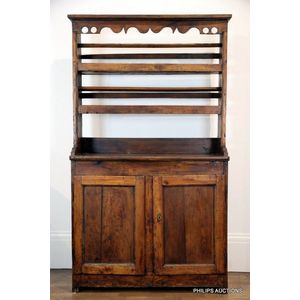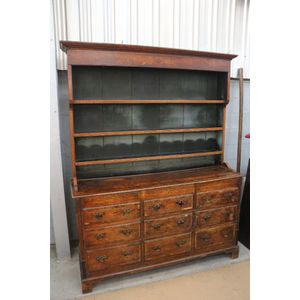
George III Elm Dresser, Early 19th Century, Open Plate Rack
A George III elm dresser, early 19th century, with a moulded cornice above an open plate rack and two shelves, the lower register with three drawers, raised on turned legs, square section to the rear, 193 cm high, 176 cm wide, 50 cm deep

George III Elm and Oak Low Dresser, Late 18th Century
A George III elm and oak low dresser, last quarter 18th century, the rectangular top with a low back above three deep frieze drawers and a shaped apron, on square supports, 89 cm high, 175 cm wide, 40 cm deep

18th Century George III Elm Low Dresser
A George III elm low dresser, last quarter 18th century, the three-plank rectangular top with cleated ends above three frieze drawers, raised on square supports, the edges of the drawer openings moulded, the sides panelled, 85 cm high, 196 cm wide, 52 cm…

18th Century Elm Dresser Rack with Open Shelves
An 18th century English elm dresser rack, with open shelves

Meiji Period Japanese Cypress and Elm Dresser
A Japanese dresser, cypress and elm, Meiji period, two sectional, 170 cm high, 188 cm wide, 69 cm deep

18th Century English Elm Dresser with Patina & Pegged Construction
A rustic English provincial elm dresser, late 18th century, with a fine patina and of pegged construction, with a decorative shaped cornice, long plank sides, an open pegged rack, the shelf above a pair of rail and stile plank doors to a plinth base,…

English Oak Welsh Dresser with Crossbanded Drawer Front
18th century English oak elm & walnut Welsh dresser with crossbanded drawer front, 160 cm (W) x 51 cm (D) x 200 cm (H)

18th Century Oak and Elm Dresser with Cupboards Below
An English 18th century oak and elm open front dresser having cupboards below, 190 cm high, 140 cm long, 40 cm deep

18th Century Welsh Dresser with Cupboards and Plate Rack
An English 18th century oak and elm welsh dresser having cupboards below, three central drawers and a plate rack above. 195 cm high, 144 cm wide, 39 cm deep.

18th Century Oak and Elm Dresser
An early 18th century oak and elm dresser with pierced scalloped cornice above open shelves, the base with six drawers, and enclosed cupboards; shaped feet. Width 161 cm

Provincial Elm Dresser Base with Plate Rack
A small provincial elm dresser base and plate rack, English, first half of the 19th century, 72 cm high, 130 cm wide, 40 cm deep

18th Century Welsh Elm Dresser Base
A Welsh elm dresser base, 18th century. 88 cm high, 195 cm wide, 46 cm deep

George III Oak Low Dresser, 18th Century
A George III oak and elm low dresser, English, 18th century. 87 cm high, 160 cm wide and 46 cm deep. Provenance: Private Collection, Melbourne

18th Century Fruitwood and Elm Dresser
Fruitwood and elm dresser 18th century rectangular top with three short drawers below, each draw with brass pulls and shaped back plates. Height 76 cm. Length 170 cm. Depth 41 cm
 Loading more...
Loading more...